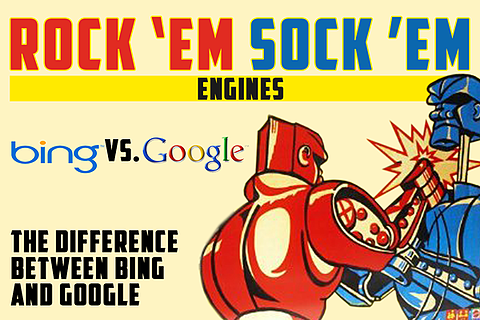Editor's Note: Our second-ever guest post comes to us from Maria Ahmed of the UK-based web design and SEO firm UC4.
In this post, Maria tackles the difference between the two search engine giants of the Post-Penguin era — Google and Bing. She explores the advantages of both, including a few surprising areas where Bing comes out ahead. Take it away, Maria.
How many of us stop and consider the search engine we use? We don’t really, do we? For myself and for millions of others, “Googling” something is second nature. Whether it is something we are in need of, whether we just fancy a quick browse or whether we are in the middle of a heated debate and need to settle a quick dispute, we Google it.
Bing vs. Google
Despite having worked within online marketing for quite some time now, I struggle immensely to come to grips with other search engines-- most importantly, Bing. Now don’t get me wrong, there is nothing wrong with Bing, it is a perfectly viable search engine. Unfortunately, I have become a creature of habit and prefer to “Google it” rather than “Bing it”... that doesn’t quite have the same ring to it, does it?
There is no doubt that the average user will wonder what the differences are between the two. After all, they are both search engines. Google is the senior of the lot, holds a stronger market share and effectively offers more results, but Bing isn’t all that bad.
I think it might be time to start being fair. I’ll take off my Team Google t-shirt (I’m not getting paid commission for this, whatever you think!) and look at this practically because when they’re compared side by side, Bing stands in a relatively strong position.
What’s the Difference?
What we know from a distance is that they are both search engines, so type in a keyword and they’ll offer you their best results. However, a close up analysis will highlight the prominent differences. As an SEO specialist I can confidently state that the Google algorithm is one almighty tough cookie to deal with. Currently it takes into account keywords, quality of content and a clean, natural and appropriate link profile. Bing, on the other hand, differs in its selection; social search is impressively dominant, and the attempt to banish link spam has not been quite as successful. With Bing, local results over take it all.
The short story is that both search engines have different algorithms and effectively give different weight to various signals. So, if you rank at position five in Google, you may not even be within the top three hundred in Bing. For the SEO specialist, this poses a challenging task. Often, a side must be picked-- and the same goes for users. Want local searches? Looking for a hotel or restaurant that your Facebook friends may have reviewed? Then Bing is your man. Looking for a something informative, something high-quality or something serviceable wherever you may be? Then Google is the one for you.
Social-Integrated Search vs. Google
Both Bing and Google provide quality results. Due to its powerful market share, it’s understandable that Google has the most. Bing, however, isn’t too far behind. Bing has accomplished Facebook integration (something the all powerful Google has yet to achieve), so when searching for a location, restaurant, hotel (or anything practical), it may be the better search engine. Let’s face it: consumers are more likely to value the review of a Facebook friend than a +1 from a G+ account.
Google’s algorithm speaks volumes. SEO teams everywhere know that link profiles must now be clean and feature content of real quality, which effectively means that the results the average user is offered are far less likely to be spam.
An obvious issue to point out right here would be the role of each search engine within online marketing. As someone who has worked on SEO for quite some time, I am aware of just how important Google is. It’s crucial for a business to abide by best practices and ensure a clean link profile (amongst other things) in an effort to rank successfully. For the smaller businesses, however, social media marketing is often the most cost effective and efficient way to procure brand growth. With Bing having successfully integrated social media into its search results, for those actively engaging on social platforms, it can quite easily allow the right results.
What’s in a Search Engine?
I keep finding myself swaying towards Google; it is hard not to, isn’t it? We amateurs can never really know what it takes to build a search engine. We quickly judge what we see, and as a self confessed SEO buff I would like to think of myself as someone who knows what she is talking about... to an extent. They are two different search engines, both algorithms give weight to different signals and they both operate, by default, on different browsers-- Google on the hip and happening Chrome and Bing on the less “with it” Internet Explorer.
Both search engines are also the market leaders for AdWords advertising but, again, the authority and market share of Google helps it stand on top because the more traffic there is, the greater the potential of the advert itself. Although many may argue that the smaller audience on Bing means less competition for keywords...a potential catch 22.
For the Online Marketing Specialist, it is all about targeting the right audience. So effectively, the needs of your business will determine which search engine is right for you. Naturally as the ‘baby’ of the bunch, Bing is going to continue facing a tough time but it hasn’t done too badly so far.
For me, however, I am a Google lover for life...


